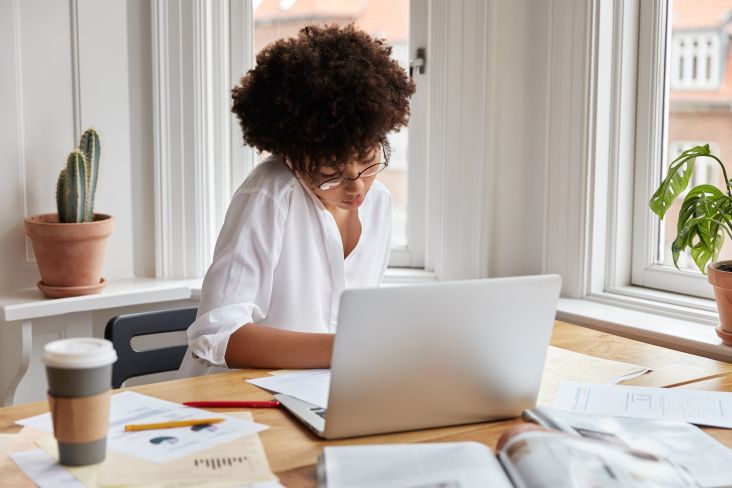Stress Management: How to deal with stress and be a happier freelancer
Stress is a silent killer. It can lead to anxiety, depression and all manner of serious health problems if left unchecked. When you freelance or work at a busy agency, you'll no doubt have temporary high-pressure periods when it feels like you can't cope.

Image licensed via Adobe Stock
But if you're feeling overwhelmed, low and exhausted all the time, it could be that stress has become a daily occurrence. And that's not good if you want to be healthy and happy.
If you're worried you might be suffering from chronic stress, it's essential to recognise the signs and know how to deal with it. Are you having trouble sleeping? Are you struggling to focus at work? Are you snapping at people over the pettiest of things? Are you over-eating or forgetting to eat altogether? Do you keep getting colds and other illnesses? These are all clues that show you might be burnt out.
The following techniques will help you reduce your suffering and become a happier, healthier freelancer:
1. Breathe more deeply
When we feel as though we're in danger, our body prepares itself for confrontation or avoidance through "fight or flight", also known as the stress response. This was particularly helpful back in our hunter-gatherer days when we suddenly crossed paths with giant, angry bears and needed our adrenaline to kick in and save us. But today, the stress response is always provoked by less momentous, daily events such as money troubles, traffic jams, or dealing with clients. And too much of it can build up and lead to serious health problems.
We obviously can't avoid stress, but we can improve the way we deal with it. For instance, you could encourage a "relaxation response" instead of through a technique first developed in the 1970s at Harvard Medical School by cardiologist Dr Herbert Benson. It's a "state of profound rest that can be elicited in many ways, including meditation, yoga, and progressive muscle relaxation".
Breath focus is a common feature of many of these techniques that evoke the relaxation response. The first step is to learn to breathe deeply. So whenever you're feeling super anxious, sit back and take a deep breath. Breathe in slowly for five seconds, then out for six. This simple act will change the chemistry in your brain, encouraging you to feel more relaxed.
For further tips on relaxation techniques, read Harvard University's excellent article on breath control.
2. Get moving and exercise
According to the NHS, research shows that physical activity can improve your mental wellbeing. It can boost self-esteem, mood, sleep quality and energy, as well as reduce your risk of stress and depression. Evidence even shows that exercise can protect you against anxiety and cause chemical changes in the brain, which can positively transform your mood.
It can also reduce your risk of major illnesses, such as heart disease and cancer, by up to 50% and lower your risk of early death by up to 30%. No one likes to talk about illness or death – but if you're going to manage and reduce your stress, then you have to understand the implications if you don't.
Get off the sofa, throw on your trainers and get moving. Exercise doesn't have to cost a penny. You don't need to join an expensive gym. What's stopping you from adding a 45-minute walk to your daily routine? Or can you cycle to work? There is no excuse. Reduce your stress and boost your mood by moving your body every single day.
3. Go for regular countryside walks
While we're on the subject of exercise, did you know that going for a countryside walk helps to clear your head, and reduce stress and anxiety? That's because strolling in natural surroundings is "good for the brain", according to a recent study by Stanford University.
Researchers found that those who took a 90-minute walk in a natural setting had lower levels of negativity and repetitive thoughts about themselves compared with those who walked in an urban environment. Furthermore, those who walked in the countryside had less activation in an area of the brain that has been linked to a person's risk of mental illness. Amazing.
As many of us now live and work in cities and urban areas, it's essential to get back to our natural roots and find some peace and calm amongst the chaos of our lives.
Need some inspiration? Walking Britain is an excellent free resource that has many suggested routes to consider. The Ramblers is a charity that has walking groups you can join nationwide and enjoy strolling with others. And then John Harris offers thousands of free walks that you can download and enjoy – highly recommended.
By only enjoying a countryside walk every weekend, you'll have used three of our techniques, all in one hit! Because you'll move your body, see lots of greenery in the fresh air and then enjoy lots of deep happy breaths when you reach the top of that majestic hill and enjoy the view.
4. Reduce alcohol intake
Some people understandably (myself included) try to soothe their stress with alcohol. A little tipple after a stressful day can feel like a positive reward – and it does often soothe. But regular drinking can increase your anxiety and make you feel worse, not better.
Alcohol is a depressant that slows the brain and central nervous system. Eva Cyhlarova from The Mental Health Foundation said: "Over time, heavy drinking interferes with the neurotransmitters in the brain that are needed for good mental health. So while alcohol may help deal with stress in the short term, in the long run, it can contribute to feelings of depression and anxiety and make stress harder to deal with."
Professor Cary Cooper, professor of Organisational Psychology and Health at the University of Lancaster, says that getting drunk is an avoidance strategy: "You're not properly confronting the issues that make you feel stressed in the first place. The best way to deal with stress is to choose a trusted friend or colleague and tell them what's worrying you. Then, together you can come up with some solutions. That's often all people need to start feeling better."
For more information on alcohol and stress, visit Drinkaware.co.uk.
5. Digitally switch off
Smartphones, tablets, iPads – they're a blessing as well as a curse. Our "always-connected" lives can damage our mental health. If you feel like you're turning into a fizzing stress monkey, consider your digital habits. Are you continually checking Twitter? Is Facebook always open on your mobile? Do you get notifications whenever someone likes your Instagram posts? Stop!
It's essential to take some time out of our digital lives. Be strict with yourself. Swap iPhone browsing on your train/bus commute to read a book instead. Turn off your gadgets after 7pm and unwind. Instagram, Twitter, emails, messages – they can wait. Here are a few quick tips to help you switch off in a digital world:
- Create digital-free zones, e.g. make your bedroom sacred and free of technology
- Switch off 'push notifications' on your smartphone and gadgets
- Carry a paper notepad around and use that instead of the 'notes' app on your smartphone
- Delete any unnecessary apps and consider removing all social media channels from your phone
- Use a real camera instead of your camera phone to capture memories
- Every time you get an urge to check something online, write it down on your notepad to 'look up' later.
6. Limit your exposure to current affairs
As a journalist, I love to keep abreast of the news and understand what's happening in the world. However, I was digesting too much of it and recognised the impact it was having on my health and happiness.
It's not just because news is depressing and can leave you feeling anxious and depressed (it invariably triggers cortisol in response to stress); it's because of the information-overload risk, and how it can distract you from other, more positive things. And because news can take up a lot of our time and concentration, it can inhibit thinking and creativity – draining us of our ability to be productive, happy freelancers.
Therefore, limit your time spent on the news. Allow yourself minimal exposure to give yourself space to breathe, think and relax. If you need further convincing, read this article by The Guardian (ironically) on why news is terrible for you.
7. Read lots of fiction
When life is stressful, it's important to find healthy ways to escape. Reading fiction is one fantastic way to give your brain a rest. Stories can transport us to other worlds and make us forget about our daily problems. Ok, so you're not actively tackling the causes of stress, but reading is a great technique to help you switch off and relax.
Even research suggests that reading can reduce stress levels by 68 per cent, according to cognitive neuropsychologist Dr David Lewis. And we only need to read silently for six minutes to slow the heart rate and ease tension in the muscles. Amazing.
Check out The Guardian's recommended summer reads for inspiration. Or find a local book club via Meetup.com for further motivation and to meet new friends.
I've just read and thoroughly enjoyed Bill Bryson's The Road to Little Dribbling: More Notes From a Small Island. I also devoured The Sound Of Waves by Yukio Mishima. And Kawakami's Strange Weather in Tokyo was also wonderful. Up next is Huxley's Ape and Essence – I'll let you know if it's any good.
8. Get better at managing work
Stress can sometimes be the result of feeling overwhelmed. And that's a common problem for freelancers who are often juggling lots of projects and clients. This is where the Eisenhower Method will become your new best friend.
It's a prioritisation framework that helps you effectively categorise tasks in order of what's essential. It's supposedly derived from a quote attributed to Dwight D. Eisenhower: "I have two kinds of problems, the urgent and the important. The urgent are not important, and the important are never urgent."
When you use the Eisenhower Method, tasks are evaluated using the following criteria:
- Important and urgent: things you must tackle immediately
- Important and not urgent: things you will schedule later that day
- Not important and urgent: things you will delegate to someone else
- Not important and not urgent: things you will dismiss altogether.
Thanks to Eisenhower, we have a helpful little method to help us decide what is and isn't important, prioritise tasks that need tackling immediately and reduce pressure and stress as a result. Download this Eisenhower Method template to help you better manage tasks, free up your time and ease off the pressure.
9. Enjoy more repetitive, mundane tasks
Did you know you can find calm in simple, everyday chores? In Buddhism, repetitive tasks are encouraged to help with the practice of mindfulness, where you pay more attention to the present moment, to your thoughts and feelings, and the world around you. It's a way of blocking out negativity and becoming a happier and calmer soul.
My meditation is my housework. I completely lose myself in polishing, dusting, hoovering and ironing. All my problems melt away, and I feel increasingly relaxed and happy after a good hour or two of cleaning.
But it doesn't have to be repetitive or mundane. You might find mindfulness in something creative like painting, sculpting or even gardening.
If you want to become more mindful, then check out BeMindful for some tips to help you get started. Or consider taking a course on mindfulness to boost your mental wellbeing.
10. Have a nice cup of tea
When all else fails, put the kettle on! It's such a British solution to everything, but there is nothing better than a nice cup of tea when the world feels like it's crumbling at our feet. And now research suggests that there's truth in that belief. Drinking a cup of tea or coffee can reduce stress by 54 per cent, according to a study by Mindlab International at the University of Sussex.
Just make sure you stop drinking caffeine at lunchtime, so you're able to get a good night's sleep. That's when I tend to switch to caffeine-free alternatives such as peppermint and nettle tea. I used to devour the fruit ones until my dentist warned me that they're not good for teeth.




 by Tüpokompanii](https://www.creativeboom.com/upload/articles/58/58684538770fb5b428dc1882f7a732f153500153_732.jpg)

 using <a href="https://www.ohnotype.co/fonts/obviously" target="_blank">Obviously</a> by Oh No Type Co., Art Director, Brand & Creative—Spotify](https://www.creativeboom.com/upload/articles/6e/6ed31eddc26fa563f213fc76d6993dab9231ffe4_732.jpg)

















